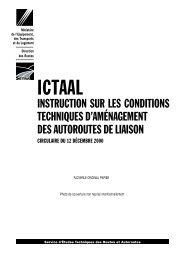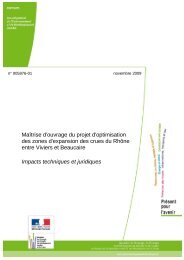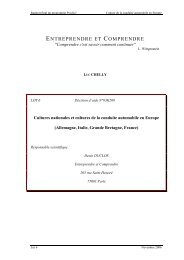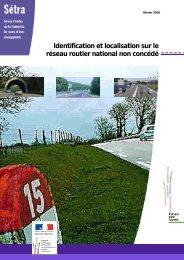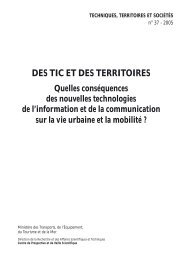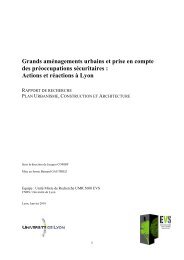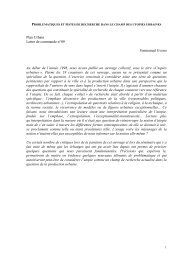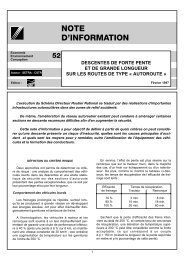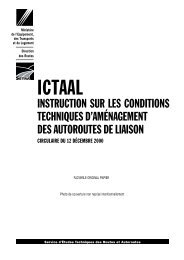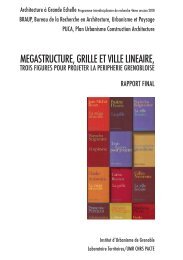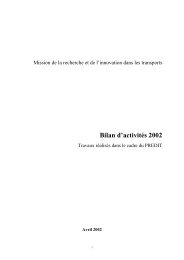Daniel Kaplan - Portail documentaire du Ministère de l'Ecologie
Daniel Kaplan - Portail documentaire du Ministère de l'Ecologie
Daniel Kaplan - Portail documentaire du Ministère de l'Ecologie
Create successful ePaper yourself
Turn your PDF publications into a flip-book with our unique Google optimized e-Paper software.
270<br />
The potential substitution ability that virtual<br />
systems or interactive computer applications have is<br />
concentrated on issues related to leisure and<br />
information collection. The i<strong>de</strong>a of substitution<br />
relates to human behaviour and existence, not to the<br />
instrumental factors (Fernback 1997: 37; Jones<br />
1995: 16). It is most questionable to think of<br />
cyberspatial encounters, Internet chat or threedimensional<br />
multi-player games as substitutes for<br />
reality. They are more like competing forms of<br />
spending leisure time – it is hard to imagine<br />
something as cyberspace presented by Gibson<br />
(1984) when the actual task performance occurs in<br />
the real-world substance. Every human action has a<br />
spatial dimension, and in cyberspace this dimension<br />
would be diminished (Mitchell 1995: 5–15;<br />
Benedikt 1991: 123). The hype created over<br />
informational technologies praising their holy<br />
power to free us from the restrictions of distance<br />
tends to be a climax achievement by the film<br />
in<strong>du</strong>stry, massive marketing power and media<br />
broadcasting. The technology is a means to improve<br />
efficiency or enlarge various contact surfaces, but<br />
i<strong>de</strong>as of substitution are extravagant.<br />
The mental and social aspects (see Lefebvre<br />
1991: 30–40; Simonsen 1996: 495; Harvey 1989:<br />
220–222) are clearly the strongest ones in the<br />
question of substitution. A largely <strong>de</strong>bated aspect of<br />
the Internet is that it makes possible large-scale<br />
communication in real time and therefore creates<br />
new possibilities to expand and select social connections.<br />
The substitution discussion is strongly related<br />
to the social transformation of human interaction<br />
through the net. Therefore, the mental experiences<br />
Dr Tommi Inkinen<br />
of these new kinds of social flows are also of great<br />
importance.<br />
These interviewed clearly indicated that the<br />
social sphere created in the net is only temporary. If<br />
more en<strong>du</strong>ring connections are to be established, a<br />
face to face meeting must be arranged. In this light,<br />
the social aspect is also controversial. The substitutive<br />
power that networks have could be evaluated<br />
as being concentrated on small talk or short-term<br />
relations and not on en<strong>du</strong>ring and long-term<br />
relations. There is also a connection to the mental<br />
experience of place. In this case, the substitution<br />
takes places when information is being gathered. It<br />
also seems that the only replacing that takes place is<br />
that the Internet and other IT-systems are<br />
replacing/enchanting the traditional channels of<br />
broadcasting information. The issues of mental and<br />
social experiences are naturally interwoven and they<br />
should not be thought of as separate entities.<br />
The information society, whether regar<strong>de</strong>d as a<br />
society of technology or a society of knowledge, has<br />
a complex and an intriguing connection to the<br />
everyday life. In this paper the focus has been on the<br />
contextuality of urban experiencing. Public –<br />
private, time of work – time of leisure, mo<strong>de</strong>rnity –<br />
post-mo<strong>de</strong>rnity are some dichotomous or <strong>du</strong>alistic<br />
phrases that compromise the core essence of<br />
ongoing <strong>de</strong>bates. The usage of public spaces,<br />
interpreted here in straightforward manner as<br />
spaces of free access, can be argued to be changeable<br />
via the technological advancements but their significance<br />
is not <strong>de</strong>clining.



